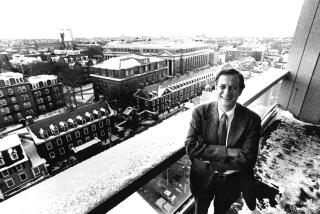Northrop Frye; Literary Critic Traced Symbols to the Bible
- Share via
TORONTO — Northrop Frye, the widely quoted but elusive literary critic who tracked myths and symbols to their biblical sources, has died, his agent and publisher said Wednesday. He was 78.
No details of Frye’s death Tuesday were announced.
A teacher and ordained minister with the United Church of Canada, the shy critic hated small talk but ministered to generations of university students. His “Anatomy of Criticism: Four Essays,” published in 1957, became a standard work. It evolved from his study of English poet William Blake’s theory of literary symbolism and Biblical analysis. Frye called the result “pure critical theory.”
Communications theorist Marshall McLuhan, a colleague of Frye at the University of Toronto, once said: “Norrie is not struggling for his place in the sun. He is the sun.”
Frye wrote more than 20 books. His lifework, “Literature and the Bible,” was a two-volume study. The first volume in 1982, “The Great Code,” delved into symbolism of the Bible. A companion work was published last month.
Whether his subject was Blake, Shakespeare or general criticism, Frye saw a pattern of recurring symbols, myths and archetypes in Western literature. He believed their key source is the Bible.
As Frye saw things, the vertical line that early man theorized as running through the universe, connecting heaven to earth and earth to hell, became a central myth of Western literature.
David Schiller, writing in Commentary, said Frye’s classic “Anatomy of Criticism” became the first non-judgmental theory of literature “which enables a student to tell where, in the totality of his literary experiences, an individual experience belongs.”
Frye saw his thesis as helping prove that “literature is not just an aggregate of text but a total structure articulating a total vision of reality.”
Frye was born in Sherbrooke, Quebec, the son of a hardware salesman and a former teacher. He grew up in Moncton, New Brunswick, where his mother taught him to read, count and play the piano before enrolling him in the fourth grade at age 8.
“My public school career was undistinguished,” said the man who later was to become one of the most widely quoted scholars of the 20th Century. “I always regarded it as one of the milder forms of penal servitude.”
After studying at United Church College in Toronto, Frye was ordained in 1936.
But he later came to feel he was more suited to a university career than one in the clergy. In 1940, he received his master’s degree from Merton College, Oxford University, and returned to Toronto to lecture at Victoria College at the University of Toronto. It became his lifelong academic home.
In 1978, he was appointed chancellor of Victoria University.
Last month in connection with the publication of “Words With Power: Being a Second Study of ‘The Bible and Literature,’ ” Frye was asked whether he considered himself a literary critic or if he found that label too simplistic.
“I don’t know if there is a word for the kind of thing that I am,” he said in a typically unassuming reply. “Although what I am is what I’ve become.”
More to Read
Sign up for our Book Club newsletter
Get the latest news, events and more from the Los Angeles Times Book Club, and help us get L.A. reading and talking.
You may occasionally receive promotional content from the Los Angeles Times.






